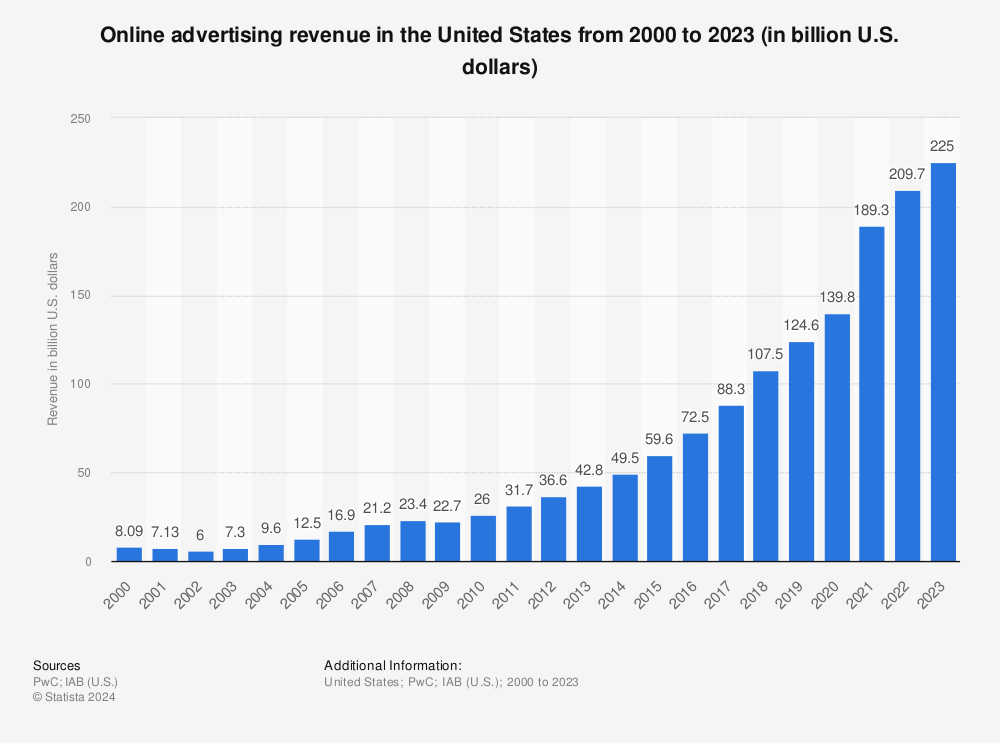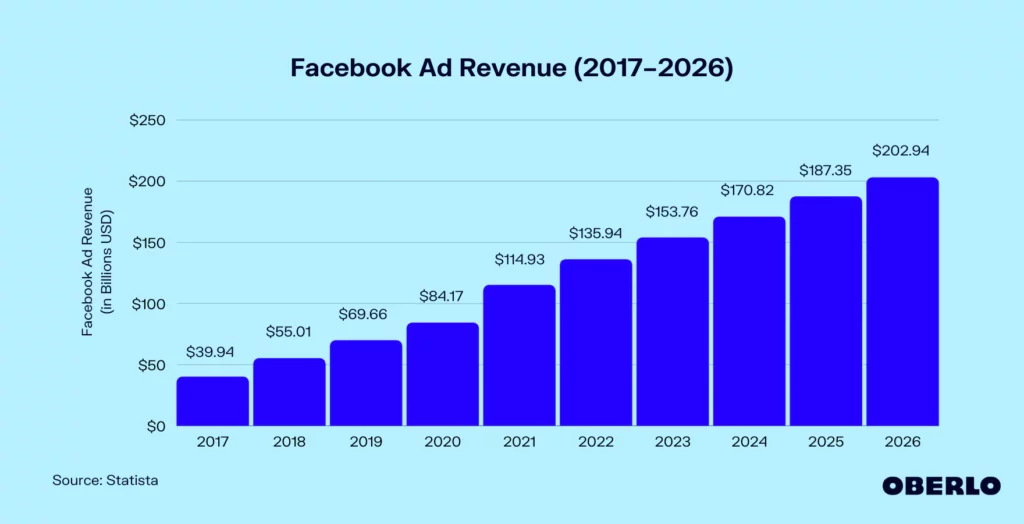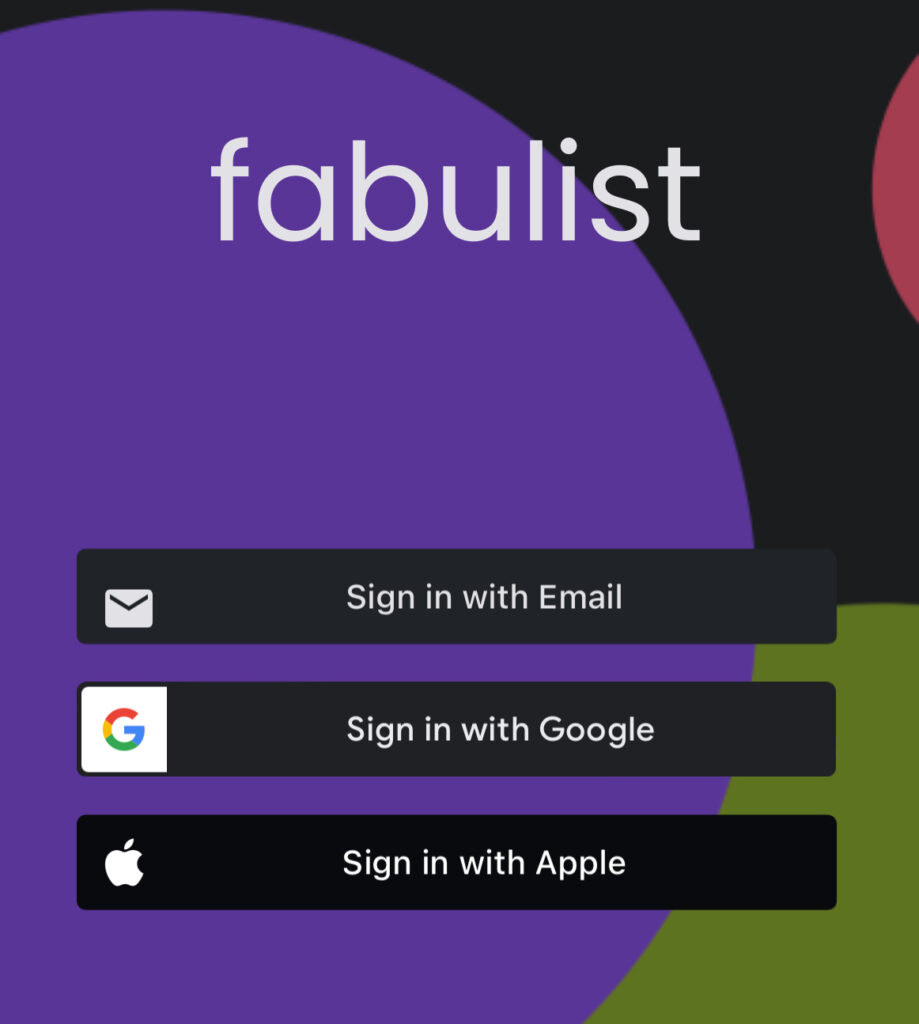Have you ever seen an ad for something you’ve talked about privately?
We all have, and yet we’ve come to accept it. But things are changing and data privacy matters now more than ever.
Around the globe, governments are increasingly strengthening digital privacy rights. Measures like GDPR in Europe and CCPA in California are empowering users with control over their data and imposing limits on data collection. Read on for why this matters and what you can do about it.
How do free services generate billions in revenue?
Have you ever wondered how free services like Facebook and Instagram handle paying for things like hosting & technology costs, their employees salary and benefits, and everything else required to run their business?
The answer is simple: They are selling you and your data.
Continued surge in online advertising revenue

For many years, Google and Facebook have offered their services for free and are among the worlds most successful companies.
Google is an advertising company. They are the most popular search engine, with a 91.58% market share, which puts advertisers directly in touch with consumers.
Meta (Facebook/Instagram’s parent company) primarily makes money by selling advertising space on its various social media platforms.
Online advertising revenue has continued to grow steadily year after year, even despite ongoing privacy concerns and difficult economic times.
Following the exponential year-over-year growth of 35.4% in 2020-2021 during the COVID-19 pandemic, a slow down in 2022 was expected due to the economic downturn. But instead of slowing down, revenue increased by 7.3% to reach their highest recorded level of $225 billion dollars.
Privacy implications
The largest revenue share comes from the performance-based pricing model, where buyers pay for quantifiable user reactions to online ads. Nearly 63% of online ad revenue is generated via this type of pricing. They can charge more for a click if it is very likely the correct audience is being targeted for the advertisement.
Unfortunately, the best way for this advertising to target you is to gather as much data about you as possible in order to do so – at the expense of data privacy. This pricing model makes it profitable for them to harvest as much data as possible to make a more accurate prediction.
And with Facebook, despite the Cambridge Analytica scandal and numerous privacy violations, Facebook’s profit grew 53%, totaling $11.2 billion of profit on $28.1 billion of revenue – up 33% from a year earlier.
Facebook’s ad revenues are expected to hit $170.82 in 2024—an 11.1% increase from 2023. It will be the fourth successive year Facebook’s ad revenues have surpassed $100 billion.
In Q4 2023, Facebook’s average revenue per user (ARPU) worldwide rose by 20.8% year over year to $13.12. This number surges to $68.44 for users in the US and Canada.

What you can do about it
It’s a widely known fact that most apps and websites are mining your data and selling it to advertisers, making billions of dollars in the process at our expense.
We’re all aware of this and we accept it because we don’t think there is anything we can do about it, right? Not true.
You can make an impact. Shift your usage to companies that care about you as a consumer and value your privacy. You may need to pay to use the service, but you’re paying to get something useful versus using a free service where you are the product.
You can consider switching your internet browser and search engine to a more privacy-conscious alternative, which is becoming a trend these days.
Additionally, Apple has continued to put additional focus on consumer and data privacy, requiring consumers to opt-in to ad sharing and requiring all third-party developers to detail their app’s privacy information. This makes the choice to not give an app your data as simple as one click to make during signup.
You can also make the switch from using apps that actively siphon your data and instead, use a safe and secure app. And when you sign up for that app, we suggest..
“Privacy to us is a human right.. a civil liberty”
-Apple CEO Tim Cook
Sign in with Apple

Sign in with Apple will limit the amount of private information apps can access, and can even give you the option to hide your email address.
Apple says it will not use it’s sign-in tool to track any of your internet activity, which is what Google and Facebook can do with their login tools.
Fabulist is proud to support Sign in with Apple – a fast, easy, and more secure way to sign into apps and websites using the Apple ID that you already have.
That said, we also support Sign in with Google. Both of these options let you create a Fabulist account in one click and sign in using your existing credentials. It’s more secure and simpler – no need to create yet another one-off account password you need to remember.
Use Fabulist to stay secure while you get things done
Fabulist makes it easy to organize, connect, and coordinate with everyone in your life – your team at work, project teams, social groups, your household, and yourself. And keep all of those conversations and content 100% private to you and away from the online advertising ecosystem.
At Fabulist, we strongly believe your data is yours alone – we will never rent, sell, or monetize your personal data– and we respect your privacy. We plan to make our money as a business by having people who love the app to pay a small fee for it to help pay our costs of operating – pretty reasonable, right?
You can rest assured knowing you will never see an ad for a tent after chatting with a teammate in Fabulist about your new love of camping. We built Fabulist out of a need in our own lives, and have found it to be incredibly useful and hope you do too.
